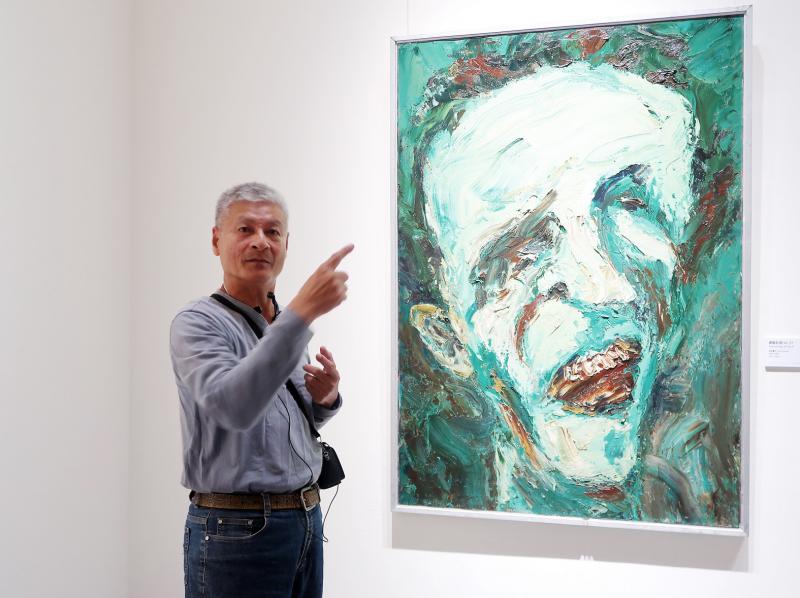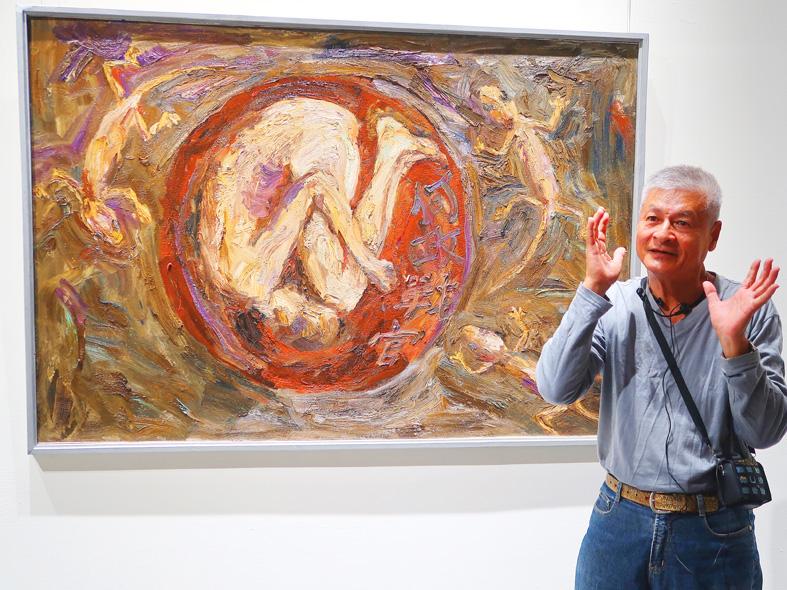An exhibit at Taipei’s Chiang Kai-shek Memorial Hall showcases work by artist Chen Wu-jen (陳武鎮), a survivor of the White Terror era.
At the age of 20, Chen was charged with sedition and jailed after scribbling anti-government phrases on the back of an aptitude test for new military conscripts as he was about to start his compulsory service.
Released two years later, Chen spent the next 20 years under government surveillance. During this time, he became an art teacher, but only painted portraits and landscapes out of fear of being imprisoned again.

Photo: Chen Yu-fu, Taipei Times
Recalling his prison experience, Chen said that one evening, he heard banging sounds from outside his room.
Later, he learned that a naval officer charged with sedition had died after being on a hunger strike, Chen said, adding that the banging sounds had been the man’s coffin being nailed shut.
In an interview with the Liberty Times (sister paper of the Taipei Times), Chen told about a teaching job he had at a remote elementary school.

Photo: Chen Yu-fu, Taipei Times
“Public transportation back then was not very good, and we had to walk about 40 minutes to get to the school. It was uncommon for teachers to bring family members back to the dormitory,” he said. “However, one female teacher brought her aunt to stay with her.”
It was only years later that he learned the government had told the female teacher to watch him, Chen said.
“About a week before I left that school to take a new teaching job in Tainan, she came to me and said: ‘My life was made miserable by you. I had to watch you, and the principal forced me to sleep with him.’”
The teacher told him that she had her aunt stay with her as a way to keep from being raped again.
Chen said that one teacher he met was imprisoned for eight years and, after his release, was forced to quit a job paving roads after only three days.
“The police had visited the boss and asked questions about the man, so the boss told him not to return to work,” Chen said.
After the lifting of martial law, Chen began painting works inspired by his experiences during the White Terror era.
Chen said that these stories and experiences inform the art he creates today, whether oil paintings, wood carvings or installations.
In some paintings, the force and direction taken by the scraper expresses emotion, while in others, the use of low-chroma grayscale tones conveys the haze of the victims, he said.
“In one piece I used a large, distorted blue-and-green face to represent those considered ‘social criminals’ in the eyes of the authoritarian regime,” he said. “Their criminal charges were unwarranted and fictitious.”
Another painting depicts the before and after of an execution conducted by a firing squad. The painting was inspired by the before-and-after photographs that prison authorities would take to show Chiang Kai-shek (蔣介石), to prove that they had carried out his orders.
“I have always felt that this shows that dictators themselves also live in fear. They are always worried about betrayal,” he said.
Chen said he hopes that the government would one day covert Chiang Kai-shek Memorial Hall into a national human-rights art museum, flanked on both sides by cultural parks.
“If such a museum is established, I will donate my works to its permanent collection,” Chen added.
The exhibit, which opened on Oct. 29, runs until Dec. 19.

A preclearance service to facilitate entry for people traveling to select airports in Japan would be available from Thursday next week to Feb. 25 at Taiwan Taoyuan International Airport, Taoyuan International Airport Corp (TIAC) said on Tuesday. The service was first made available to Taiwanese travelers throughout the winter vacation of 2024 and during the Lunar New Year holiday. In addition to flights to the Japanese cities of Hakodate, Asahikawa, Akita, Sendai, Niigata, Okayama, Takamatsu, Kumamoto and Kagoshima, the service would be available to travelers to Kobe and Oita. The service can be accessed by passengers of 15 flight routes operated by

MORE FALL: An investigation into one of Xi’s key cronies, part of a broader ‘anti-corruption’ drive, indicates that he might have a deep distrust in the military, an expert said China’s latest military purge underscores systemic risks in its shift from collective leadership to sole rule under Chinese President Xi Jinping (習近平), and could disrupt its chain of command and military capabilities, a national security official said yesterday. If decisionmaking within the Chinese Communist Party has become “irrational” under one-man rule, the Taiwan Strait and the regional situation must be approached with extreme caution, given unforeseen risks, they added. The anonymous official made the remarks as China’s Central Military Commission Vice Chairman Zhang Youxia (張又俠) and Joint Staff Department Chief of Staff Liu Zhenli (劉振立) were reportedly being investigated for suspected “serious

ENHANCING EFFICIENCY: The apron can accommodate 16 airplanes overnight at Taoyuan airport while work on the third runway continues, the transport minister said A new temporary overnight parking apron at Taiwan Taoyuan International Airport is to start operating on Friday next week to boost operational efficiency while the third runway is being constructed, the Ministry of Transportation and Communications said yesterday. The apron — one of the crucial projects in the construction of the third runway — can accommodate 16 aircraft overnight at the nation’s largest international airport, Minister of Transportation and Communications Chen Shih-kai (陳世凱) told reporters while inspecting the new facility yesterday morning. Aside from providing the airport operator with greater flexibility in aircraft parking during the third runway construction,

American climber Alex Honnold is to attempt a free climb of Taipei 101 today at 9am, with traffic closures around the skyscraper. To accommodate the climb attempt and filming, the Taipei Department of Transportation said traffic controls would be enforced around the Taipei 101 area. If weather conditions delay the climb, the restrictions would be pushed back to tomorrow. Traffic controls would be in place today from 7am to 11am around the Taipei 101 area, the department said. Songzhi Road would be fully closed in both directions between Songlian Road and Xinyi Road Sec 5, it said, adding that bidirectional traffic controls would